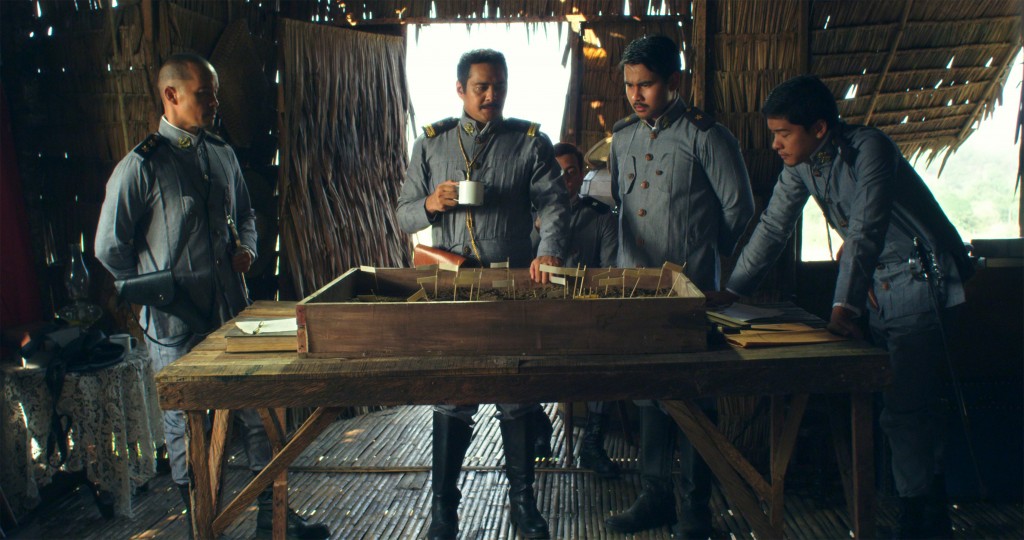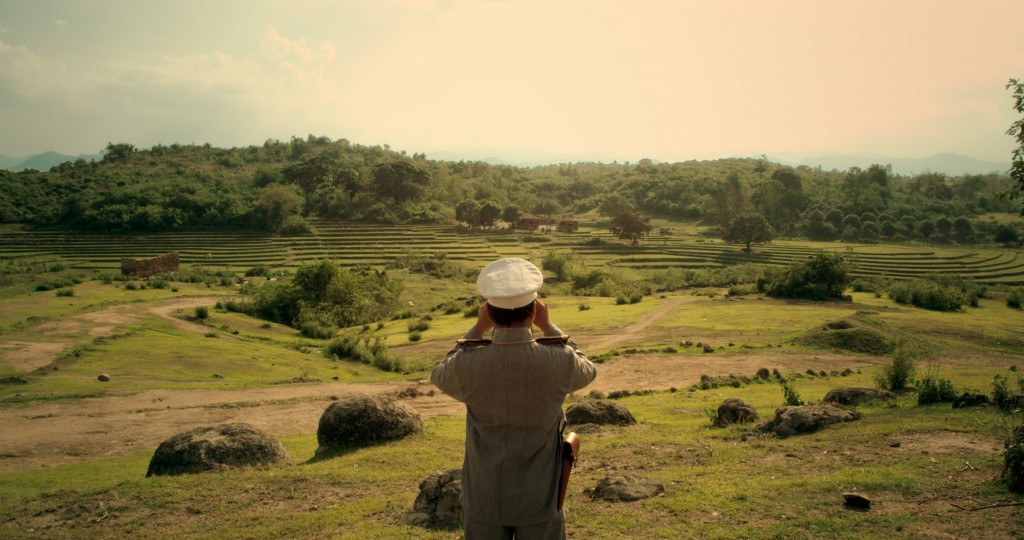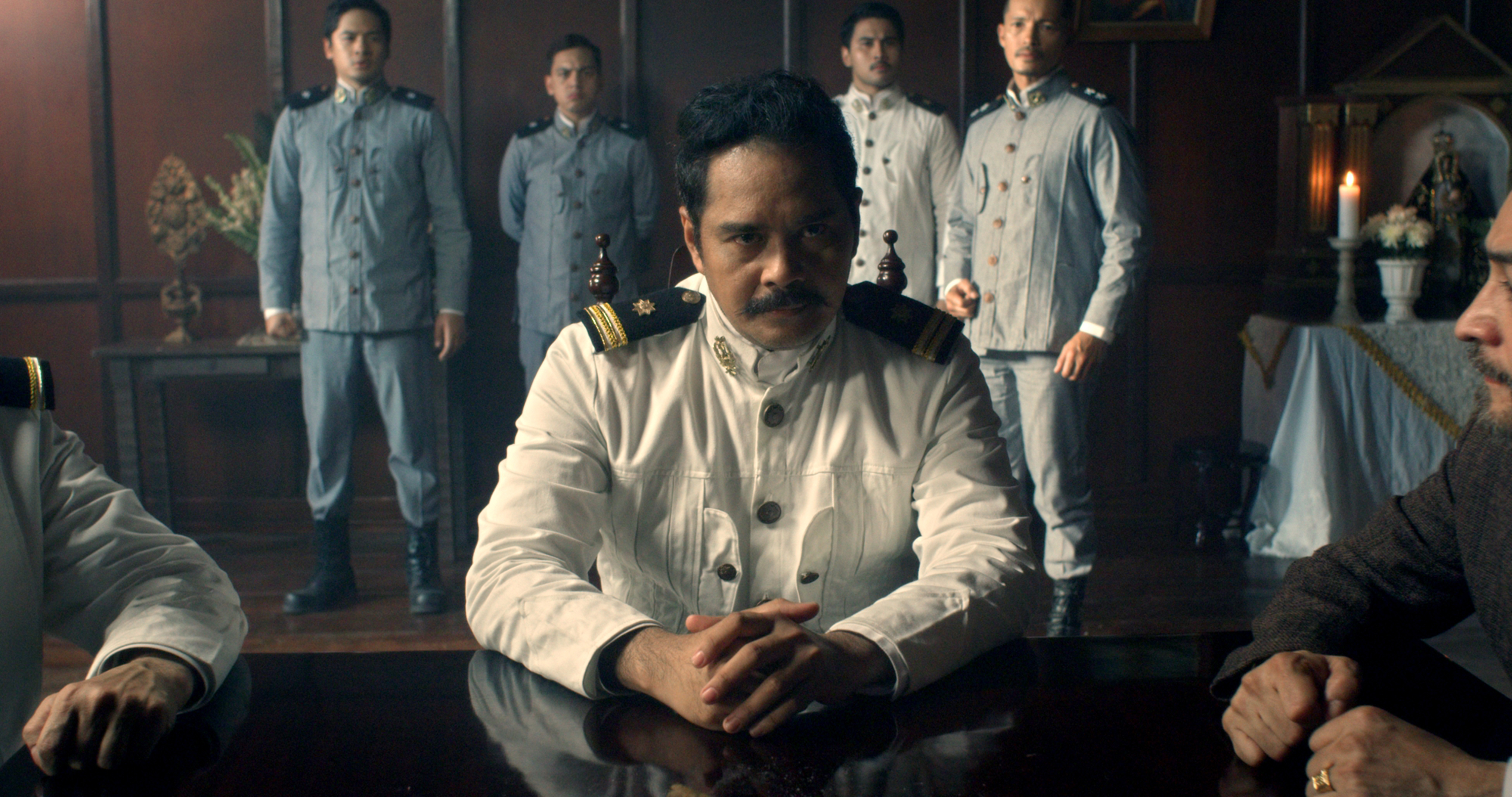Amidst pacing problems, Heneral Luna manages to tell a compelling story – allegorical and timely to present day – supported by a fantastic script, an impassioned score, and inspired cinematography.
At first glance, one might mistake Heneral Luna as your run-of-the-mill historical biopic that showcases a hero of yore whose bravery and passion unite his people in the face of dastardly foreign invaders. Well, this is only partly correct. There are invaders, Heneral Luna (John Arcilla) is indeed fiercely brave and madly passionate, but there is no unity to be found amongst country men – only infighting, personal interests, and politicking.
Directed by Jerrold Tarog and with a script co-written by him, Henry Hunt Francia, and E.A. Rocha; Heneral Luna takes a different approach in telling the story of how we lost the battle and got occupied by the Americans. Taking cues from Oro, Plata, Mata; the movie deliberately puts the colonialists in the periphery, making them merely a backdrop whose presence stirred the pot. The real focus here is the tension, the inner turmoil, that brewed in the ranks of our so-called Filipino founding fathers. Heneral Luna is a tale of how a dissenting voice can get swept away and ultimately perish under a wave of egos and personal interest.
Carrying the weight of the story is the above stellar performance of John Arcilla in the title role of General Antonio Luna. Arcilla plays with the whole spectrum of emotions in his portrayal of the larger-than-life general. He is able to showcase the fierce, boisterous, and volatile man the general has been historically known to be, yet he is also able to flip the coin and show the passionate, sympathetic, and battle-weary softer side of the character. Here’s a man who rides head first screaming into battle just to rile up his troops’ morale, but at the same time he is a one who can share warm moments and some banter with his mother. He is an antihero – the Wolverine of the Filipino insurrection.

One prime example of just how dynamic Arcilla’s portrayal can be is during this one scene involving a chicken vendor. Delivering virtually the same line of dialogue on two separate moments, Arcilla is able to convey anger bordering on madness at first and compassion nuanced with frustration soon after. It is truly his performance that propels Heneral Luna (and, sadly, his alone).
There isn’t much to be said about the rest of the cast of movie, which is a pity given that Heneral Luna assembles quite an ensemble. You’ve got names like Joem Bascon, Alex Medina, Mon Confiado, Nonie Buencamino, Mylene Dizon, and even Ronnie Lazaro; but sadly none of the other performances stand out. Not that there are any weak performances, it’s just that none are able to keep up with the gravitas of John Arcilla’s Luna. Mon Confiado’s Emilio Aguinaldo seems more like a spineless weakling who hides behind his cohorts rather than a respected political foil; while Ketchup Eusebio’s Capt. Janolino, the leader of Luna’s killers, feels too forced as a villain scorned by the titular general. The closest character who can keep up with Luna’s onscreen presence is his equally proud contemporary, Heneral Mascardo (Lorenz Martinez) – whose refusal to give in to Luna provides a tension-filled back-and-forth sequence in the middle of the film. Unfortunately, because of some jagged pacing, tension such as is this is not consistent throughout the movie.
This erratic pacing is felt most during the first act of Heneral Luna – where things play out very much like an oral history. Used as plot device to serve as the audience’s perspective, Arron Villaflor portrays journalist, Joven Hernando, who is tasked to interview the general. This frame narrative leads to various snippets that feature Luna’s patriotism: from an expertly-shot rowdy meeting with Aguinaldo’s cabinet to earlier battles against the Americans. Oddly, these scenes just feel lacking in connective tissue. Its pacing is too quick to really tie the storytelling together and it doesn’t help either that some set pieces looked too clean and glossed over – lacking the grit and weariness you’d expect from a war movie. Couple this with efforts to add humor at some odd moments throughout the film, and you’ve got a trifecta that hinders the movie from fully immersing you.

Heneral Luna more than makes for these flaws though through its artistic components – such as its beautiful score, well-crafted cinematography, and, most especially, its fantastic rhythmic script.
Technically marvellous is the only way to describe the movie’s sound design – from Luna’s table banging overpowering the raucous in a cabinet meeting, to a guitar mini-concert midway the film, to the overall masterful score. You have to give it to effort put in by Jerrold Tarog, who not only directed the movie but also provided its music.
All sorts of appealing too is Heneral Luna‘s cinematography. One scene you have to look out for is the flashback sequence to the general’s youth. This particular scene employs one long take, seamlessly moving from different sets that pass of as a childhood home, Europe, and other settings from different timelines. It is a visual spectacle, innovative and masterful in its execution.
Most notable though among the movie’s artistry is its script. Poetic yet conversational, Heneral Luna‘s script is filled to the brim with flowery lines of dialogue as if lifted from a sonata. It’s not everyday that you get to hear lines as beautifully crafted as “kailangan mong tumalon sa kawalan,” “digmaan ang iyong asawa, ako lamang ay iyong querida,” and “para kayong mga birhen na naniniwala sa pag-ibig ng puta.” Here is a script so elegant that it can even make curse words sound so cultured, so tasteful.
Overall, Heneral Luna is not just a film but a wake up call driving the ever reminder that some things never change. Its message – we Filipinos are our own worse enemies, lacking in resolve and torn by self-interests. It is a story representative of not just our current and still chaotic political landscape but of who we are and what we can do but don’t. Though it may not be perfect in its execution, the film does its duty in leaving us with the question lingering “Bayan o sarili?“


